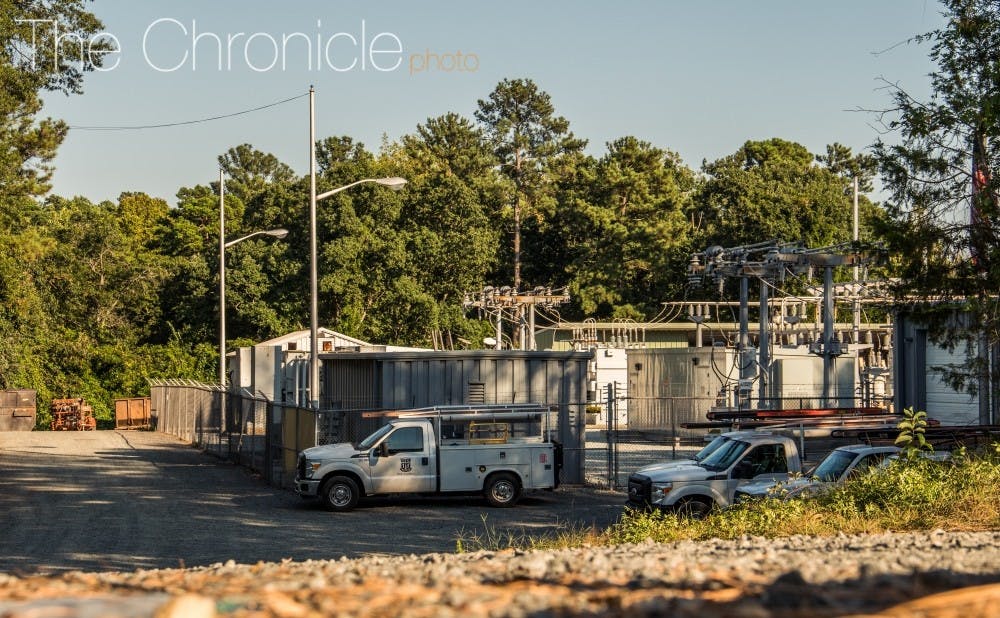The University has delayed a decision on whether to build a power plant on campus after heavy criticism of the proposal and a recent report issued by a subcommittee of the Campus Sustainability Committee.
Last May, the University announced plans to build a $55 million, 21-megawatt natural gas-fired combined heat and power plant on campus in partnership with Duke Energy Carolinas, a subsidiary of Duke Energy.
However, after public outcry from faculty, students and community members, Duke Energy asked North Carolina regulators to postpone the approval process until May 2017 in hopes that the University could consult with stakeholders.
A subcommittee of the Campus Sustainability Committee released a report Monday evaluating the construction of the proposed plant. After receiving it, the University indicated it would not bring the proposal to the Board of Trustees in May, and that deliberations will continue into later semesters.
“The [Campus Sustainability Committee's] report was thorough, well informed and reflected a range of views,” wrote Michael Schoenfeld, vice president for public affairs and government relations, in an email Tuesday.
President Richard Brodhead and the administration in the past have defended the plant as an efficient way to support Duke Hospital in the event of an emergency or a power outage. However, the report was unable to reach a consensus about whether the plant should be built. According to the report, some subcommittee members found it an efficient and low-cost option, whereas others wanted the University to further investigate alternatives and talk to shareholders.
But the subcommittee—comprised of faculty, staff and students—did agree on several criteria that should be met if the University actually does build the plant. Now that Duke has postponed the decision, these factors will be important during future discussions. Particularly important provisions included requiring that the plant comply with the Clean Air Act and allowing the University to exit the contract after 10 years if a better alternative presents itself.
Using biogas—a renewable energy source fermented from organic materials—instead of fossil fuels was also a sticking point. The subcommittee recommended that the University obtain enough directed biogas through swine waste to “render the CHP plant carbon neutral in its first year of operation.” It added that the University should fully power the plant with directed biogas within five years of operation.
Should these conditions prove impossible to fulfill, the report recommended the plant proposal be scrapped, noting that future research on biogas feasibility is warranted. To conduct further research, postponing the decision might be the ideal scenario, said Tim Profeta, chair of the subcommittee and director of the Nicholas Institute for Environmental Policy Solutions.
“There was a projection of the greenhouse gas benefits that could be achieved through various different options and energy investments the University could make,” he said. “And to begin to use biogas to provide our hot water and steam needs is the biggest reduction the University could make.”
Sophomore Claire Wang, president of the Duke Climate Coalition and subcommittee member, said she was pleased by the University's decision. She urged Duke to be confident that it can meet these biogas criteria before creating the plant.
She pointed to a prior University project in Yadkin County investing in swine waste technology at a farm as a potential precedent for the use of biogas. The University also needs to consider environmental justice concerns, she said.
“The way that pork is produced is through concentrated animal feeding operations, which gather thousands of pigs in one location and of course produce a lot of waste," Wang said. "This manure is typically gathered in lagoons and produces horribly noxious odors and gasses, which are an environmental justice hazard for surrounding communities, who tend to be lower-income and people of color.”
Both the report and Wang also emphasized that better communication in this process and other similar endeavors can play an important role moving forward. In a prior forum about the plant, one speaker described the consultation process as “flawed from the start,” and transparency has been a concern ever since the plan was announced.
“[The subcommittee] recommends that any investment with a significant greenhouse gas impact on Duke’s operations be brought to the Campus Sustainability Committee for discussion very early in its consideration, and that the CSC engage in stakeholder dialogue,” the report stated.
Likhitha Butchireddygari contributed reporting.
Get The Chronicle straight to your inbox
Sign up for our weekly newsletter. Cancel at any time.

